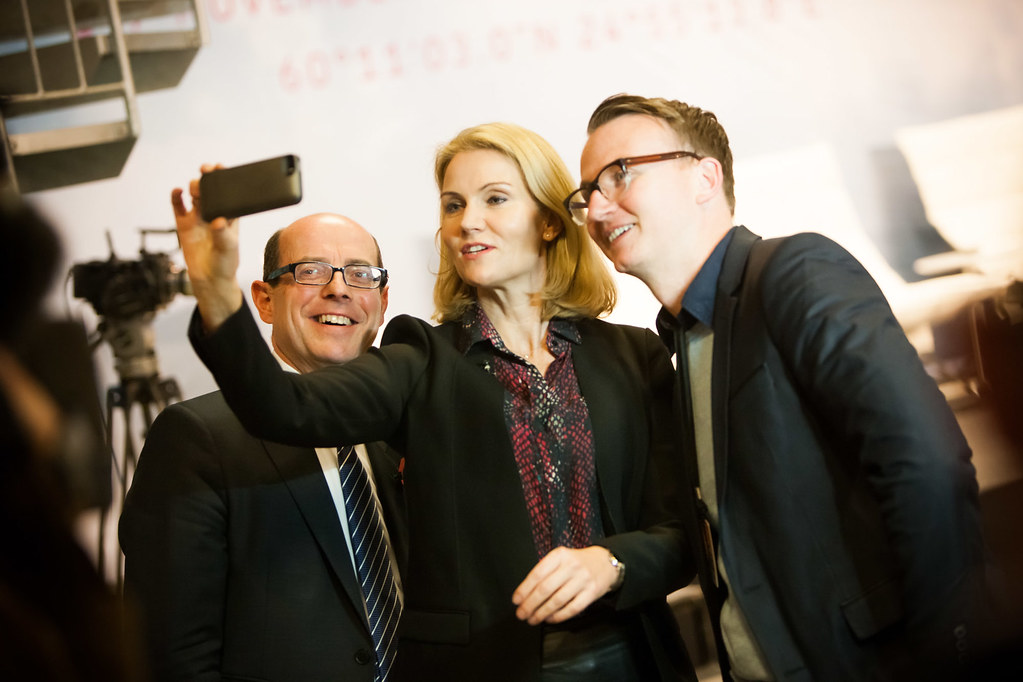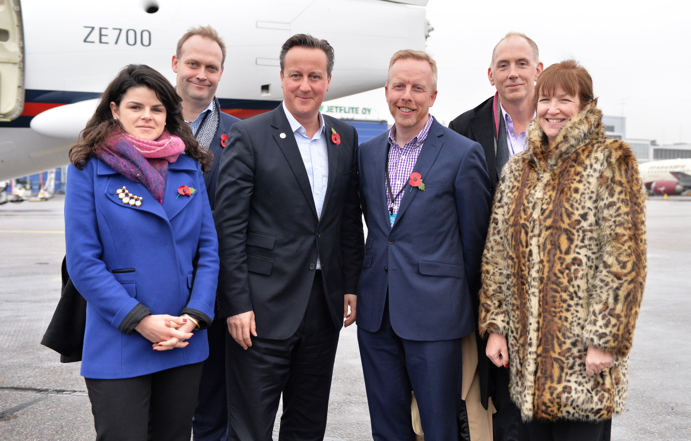NFF is an unusual, informal annual gathering of nine prime ministers from the UK and the Nordic and Baltic countries: Sweden, Finland, Norway, Denmark, Estonia, Latvia, Lithuania and Iceland.
It is like an unconference: a collaborative exchange of ideas, without any of the policy or pre-negotiated activity behind G7 or regular EU meetings.
It’s a place to get friendly with government leaders, though David Cameron wisely declined a photo opportunity in the sauna.
Following the hosts’ attempts to hide the drizzle and darkness that is typical of Finland at this time of year, the prime ministers found themselves sat on beach chairs against a blue sky backdrop – before breaking into groups to listen to the delegate talks on energy and education, new company innovation and policy ideas.
The prime ministers occasionally popped out to deal with a crises or business as usual. Finland’s prime minister Alexander Stubb even popped out calmly to field a vote of no confidence in his own government coalition (which he won 97/94), before returning to the stage with police escort to declare: “Carrying on where I left off, but where’s my beer.”
Next door, a hive of journalists – dominated by the core UK crowd of Nick Robinson et al – popped in to take selfies with Denmark’s prime minister Helle Thorning-Schmidt, while Stubb even tried out a new selfie stick.

But come question time, it was only Cameron who was bombarded with questions as journalists quizzed him on the £1.7 billion EU bill, which was being decided at the same time elsewhere by finance ministers. Prime ministers were remarkably calm in fielding back.
Getting an unexpected bill as a CEO or prime minister is normally very alarming, particularly when unpicking the rationale needs a PHD in nuclear or actuarial accounting, or trying to understand a household energy bill made up of anticipatory direct debits.
The EU one seems linked to the ‘dark arts’ of Central European tax and accounting, becoming more visible with the recent LuxLeaks magical round-trip tax processes or the new GNI process of calculating national income, which now includes the black economy of drug trade, prostitution and the dodgy off-book accounting that it seems Central Europe have long since included in their GDP calculation, and therefore EU payment.
The UK now has a retrospective estimate of all this untaxed spurious activity since 1995 and former governments, resulting in a charge and rebate for those who have always ‘valued’ this part of their economy.
The new European accounting ESA10 also changes how things like pensions and deficits are reported going forward, storing up new barrels of fun in the future.
I presented in an energy session on grid edge energy security (such as our Moixa Maslow energy storage at grid edge) and new innovative energy finance models that could release billions into funding household measures and long-term infrastructure like interconnects.
Meanwhile, Shaun Kingsbury from the Green Investment Bank showed other prime ministers how that institution has supported £1.6 billion of a £3.8 billion fund into multiple projects and clean tech funds delivering in the UK.
The three other UK delegates presented on how technology is changing the future of education: Simon Nelson from FutureLearn talked about MOOCs (Massive Open Online Courses), which are changing or rather extending the reach and virtual attendance of leading universities; Alice Bentinck discussed CodeFirst, which encourages young women to code; and Professor Angela Mcfarlane spoke on authentic learning and how schools and teaching is changing with more ICT use.
The event, which was set in a business and engineering incubator for new university companies, concluded with ideas fed back by the prime ministers, before we were literally whisked away by the fab No10 team into vehicles that followed flashing-light escorts through closed motorways, straight onto a runway and onto one of the royal planes.
With a red box on the floor in front of me I sipped on a rather pleasant cream tea, before we landed and were driven into town – getting me home less than 40 minutes after touching down.
I think I could get into this jet and no borders feel. My brief northern exposure felt as casual as popping on a train to Cambridge and back for a chat.
With Europe stalling and at a political crossroads compared to strong economic growth across these northern states – and shared problems on learning, energy and ageing – I can see a future for growth business in paying more focused and cluster attention to this northern market.






